Overview
This article identifies the most effective project management systems designed to streamline workflows for startups. Notably, systems like Casy, ClickUp, and Asana are evaluated for their unique features, including automation, user-friendliness, and adaptability. These attributes collectively enhance productivity and foster collaboration in fast-paced business environments.
Have you considered how the right project management tools can transform your startup's operations? By leveraging the strengths of these systems, founders can tackle the challenges of scaling their businesses. Each system offers distinct advantages that cater to various needs, making it essential to choose one that aligns with your specific goals.
In conclusion, selecting the appropriate project management system can significantly impact your startup's efficiency and success. Explore the features of Casy, ClickUp, Asana, and others to find the best fit for your team. The right choice not only streamlines your workflow but also empowers your team to collaborate effectively, driving your startup toward greater achievements.
Introduction
Navigating the chaotic waters of startup management can often feel overwhelming. Countless tasks vie for attention, and collaboration tools promise to streamline processes. However, with the right project management system, startups can transform their workflows, enhance productivity, and foster effective team collaboration. This article delves into ten exceptional project management systems tailored for startups. Each offers unique features and benefits designed to simplify operations. But which of these tools truly stands out in an ever-evolving landscape? How can they address the specific challenges faced by new businesses? Let's explore these pivotal questions.
Casy: Automate Task Management with Seamless Chat Integration
Casy distinguishes itself by automating task management through seamless integration with popular chat platforms like Slack and Telegram. By capturing key information from conversations, Casy transforms discussions into actionable tasks without requiring manual input. This level of automation not only saves valuable time but also significantly reduces the risk of miscommunication, enabling teams to concentrate on their core activities.
With features such as automated task creation, planning, and the ability to categorize tasks into areas like R&D and Bugs, Casy is specifically designed to enhance productivity in fast-paced business environments. In 2025, the trend of automation in management applications is anticipated to keep expanding. New businesses are increasingly depending on these solutions to enhance workflows and facilitate collaboration.
Consider this: thriving companies utilizing Casy for task management automation have reported saving over 10 hours each month by automating frequent activities. This statistic highlights the transformative effect of incorporating chat features into their operations. Furthermore, specialists anticipate that the increasing influence of AI on workplace productivity will reshape the function of productivity resources. This evolution will render these tools crucial for startups seeking to improve efficiency and group dynamics.
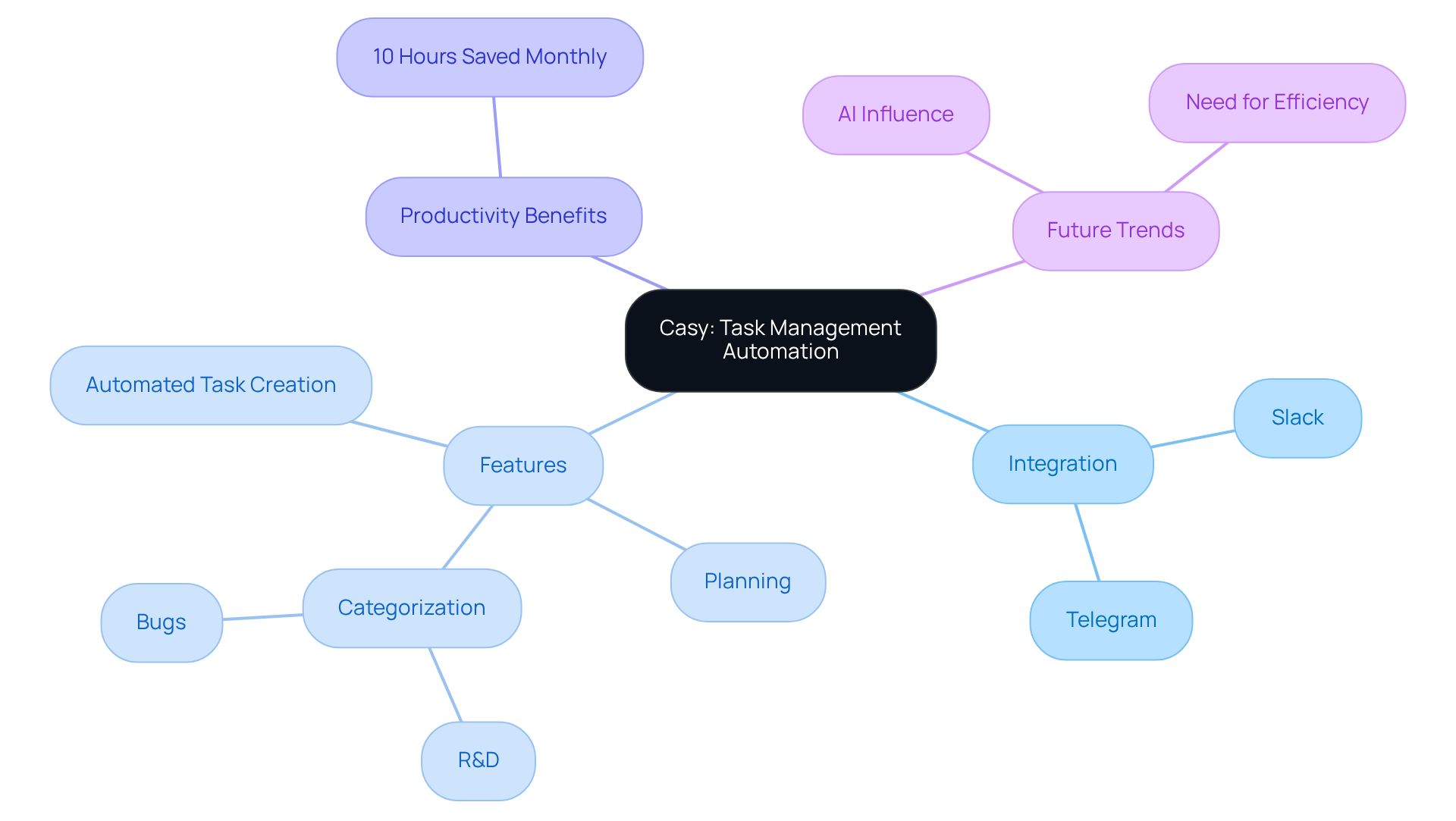
ClickUp: Comprehensive Project Management with Goal Tracking
ClickUp stands as a robust project management systems tool, seamlessly integrating task management, goal tracking, and collaboration features. Its customizable dashboards empower teams to visualize progress and align daily tasks with overarching objectives, fostering a unified direction.
Have you considered how your startup could benefit from enhanced workflows? By leveraging ClickUp, teams can ensure that every member remains aligned and focused on shared goals. This alignment is crucial; studies indicate that happy workers are 20% more productive, underscoring the importance of effective goal tracking in driving business success.
With its flexibility, ClickUp adapts to various industries, making it an essential project management system for startups aiming to boost productivity and streamline operations.
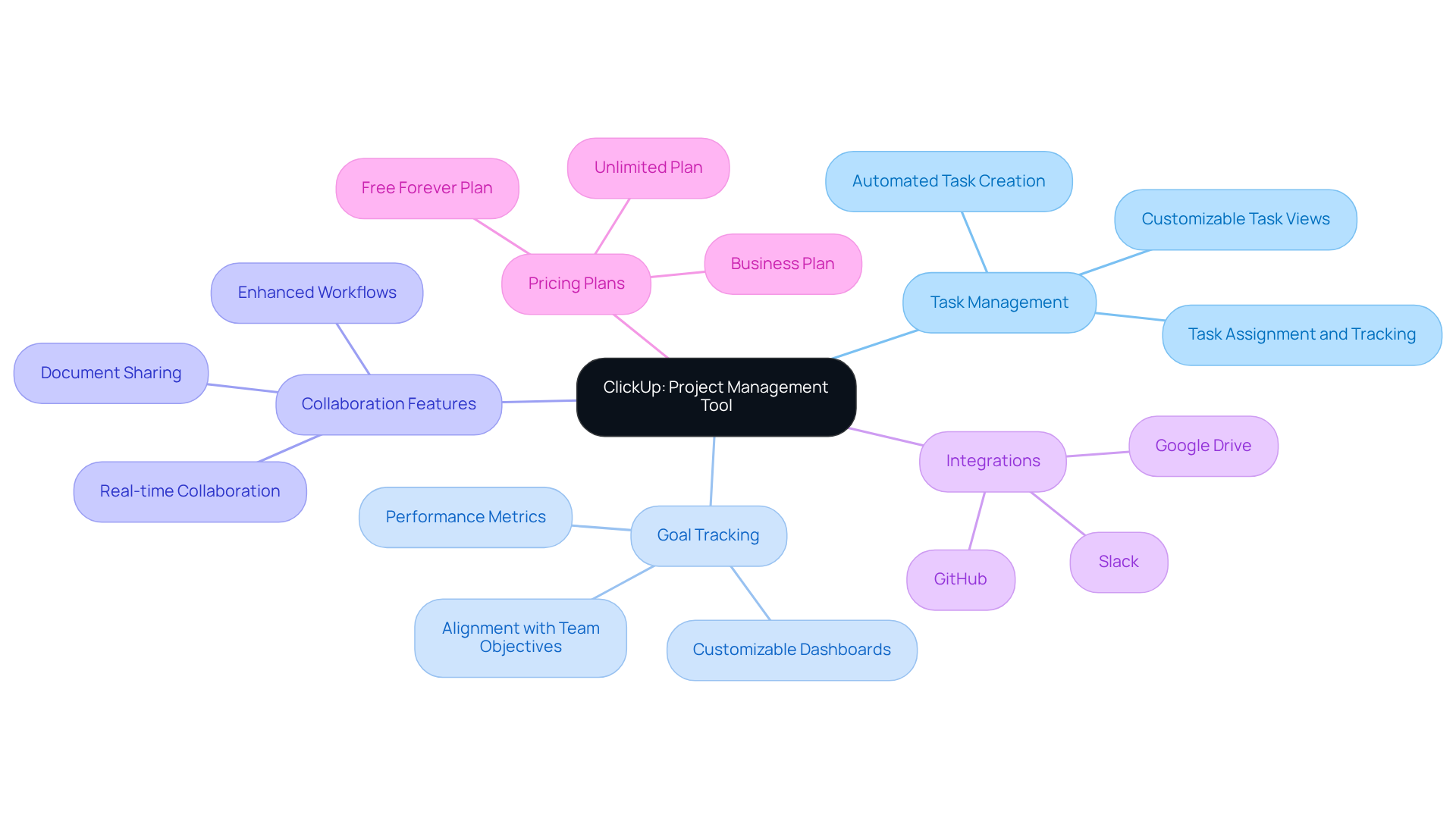
Asana: User-Friendly Interface for Effective Team Collaboration
Asana stands out for its user-friendly interface, which significantly enhances group collaboration. This platform empowers teams to initiate projects, assign tasks, and track progress with remarkable ease. With features such as timelines and task dependencies, Asana is one of the project management systems that enables startups to manage their projects with efficiency. Its inherent simplicity ensures that teams can quickly adapt to the platform, minimizing training time and boosting productivity from the outset.
But how does Asana facilitate remote work? With powerful visual tools, seamless communication features, and advanced automation, it proves to be an ideal solution for remote teams striving for coordination, no matter where they are located. Notably, research demonstrates that user-friendly interfaces can yield a 20% improvement in group collaboration efficiency, underscoring the importance of simplicity in management software.
However, it is crucial to consider that Asana's task-centric model in project management systems may pose challenges for larger teams managing complex projects. This is a vital consideration for startup founders who are contemplating scaling their operations. Are you ready to explore how Asana can transform your team's productivity while being mindful of its limitations?
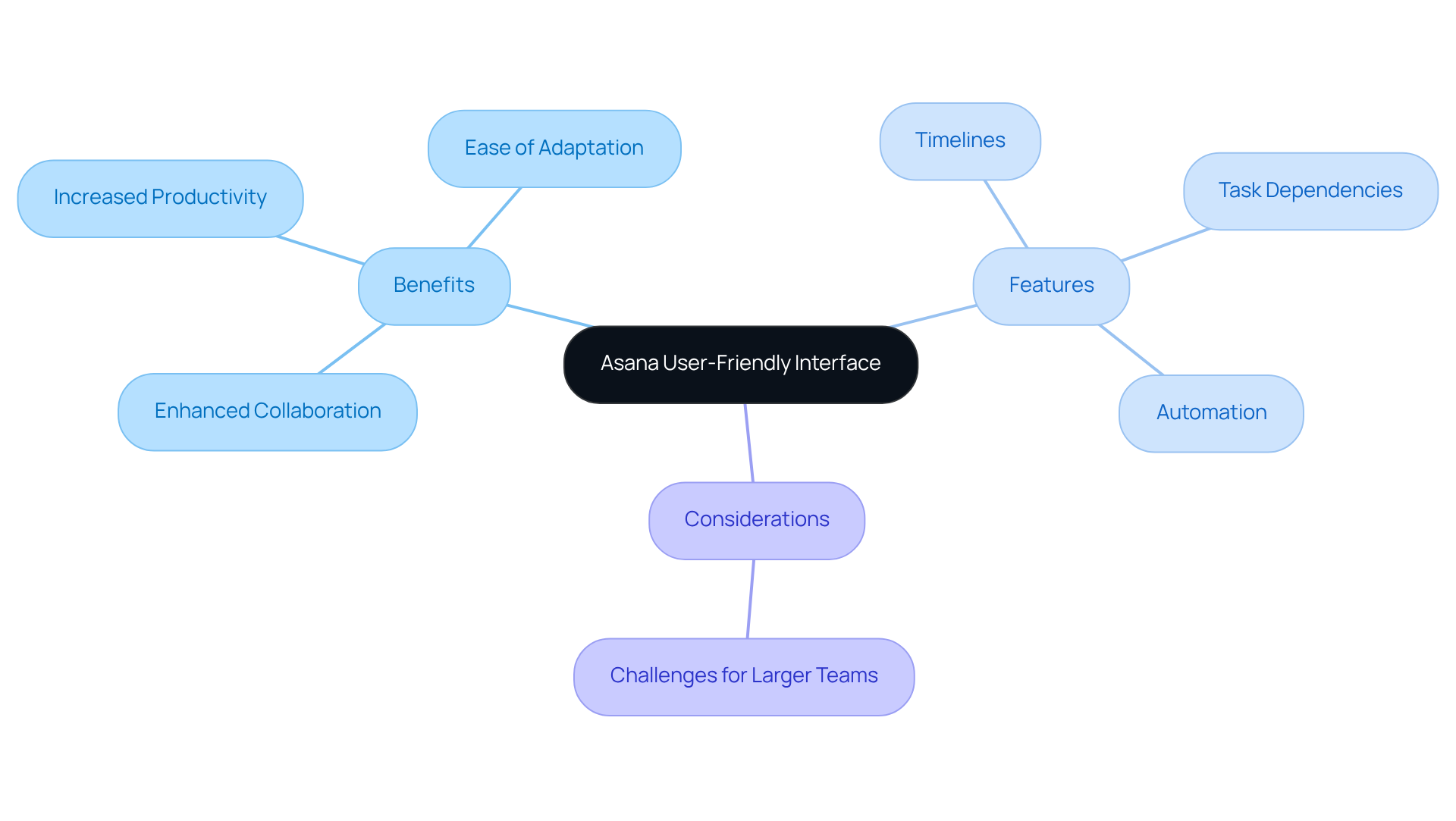
Trello: Visual Task Management with Kanban Boards
Trello employs a visual Kanban board system that empowers teams to manage tasks and projects with remarkable efficiency. Each task appears as a card, easily movable across different stages of completion, providing a clear overview of project progress. This visual approach not only enhances collaboration but also fosters accountability among team members, positioning Trello as an excellent choice for startups aiming to achieve clarity in their workflows. The platform's intuitive design allows teams to focus on execution, reducing distractions from complex procedures.
Recent enhancements, such as the Trello Inbox feature, streamline task management by enabling users to capture tasks from various sources, thereby boosting overall productivity. Additionally, Trello's integration capabilities with tools like Slack and Microsoft Teams, alongside its automation features, make it a versatile option for startups. However, it's crucial to note that Trello may face scalability challenges for larger projects, a consideration that startups should keep in mind when evaluating their management needs.
As Gaurav Kataria, Atlassian’s head of product for Trello, underscores, the priority should be on enhancing individual user productivity rather than attempting to cater to every possible need. By leveraging Kanban boards, Trello transforms task management into a streamlined and engaging experience. Are you ready to elevate your team's productivity with Trello?
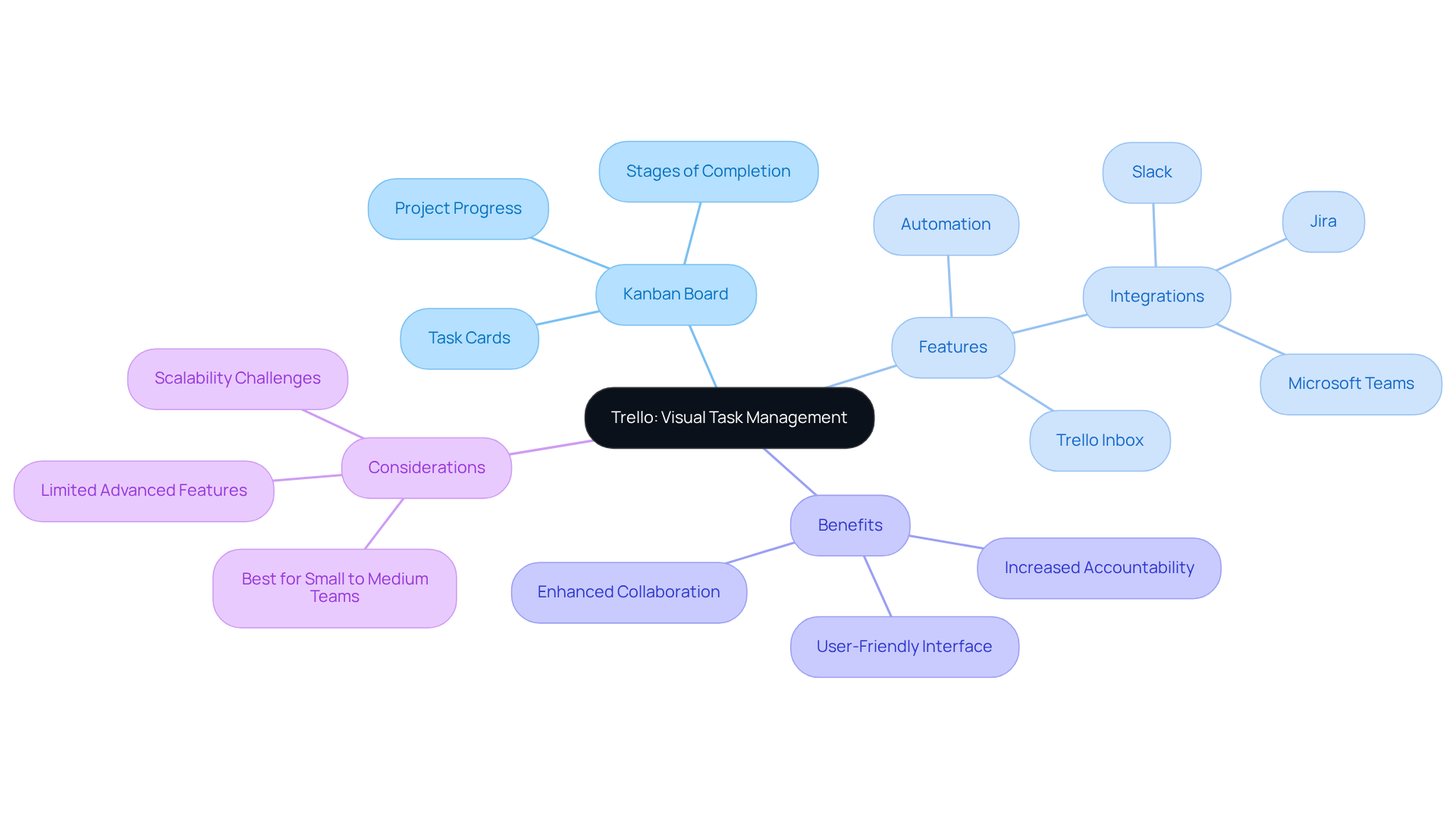
Monday.com: Customizable Workflows for Diverse Teams
Monday.com serves as a flexible project management system that empowers teams to create customizable workflows tailored to their specific needs. With features such as visual task tracking, automation, and seamless integrations with other tools, Monday.com is one of the project management systems that allows startups to optimize their processes effectively. Operating in over 200 countries and boasting approximately 245,000 clients, its versatility in project management systems makes it suitable for diverse teams, ensuring that every project is managed efficiently, no matter its complexity. The platform employs methodologies like OKRs and the Eisenhower Matrix to help teams prioritize their tasks with precision.
While Monday.com provides robust solutions, it is crucial to acknowledge potential limitations, including difficulties with customization for particular requirements. As organizations increasingly face the complexities of modern work environments, utilizing project management systems to tailor workflows becomes essential for enhancing team efficiency and collaboration. Are you ready to transform your team's productivity with a platform designed for flexibility and effectiveness?
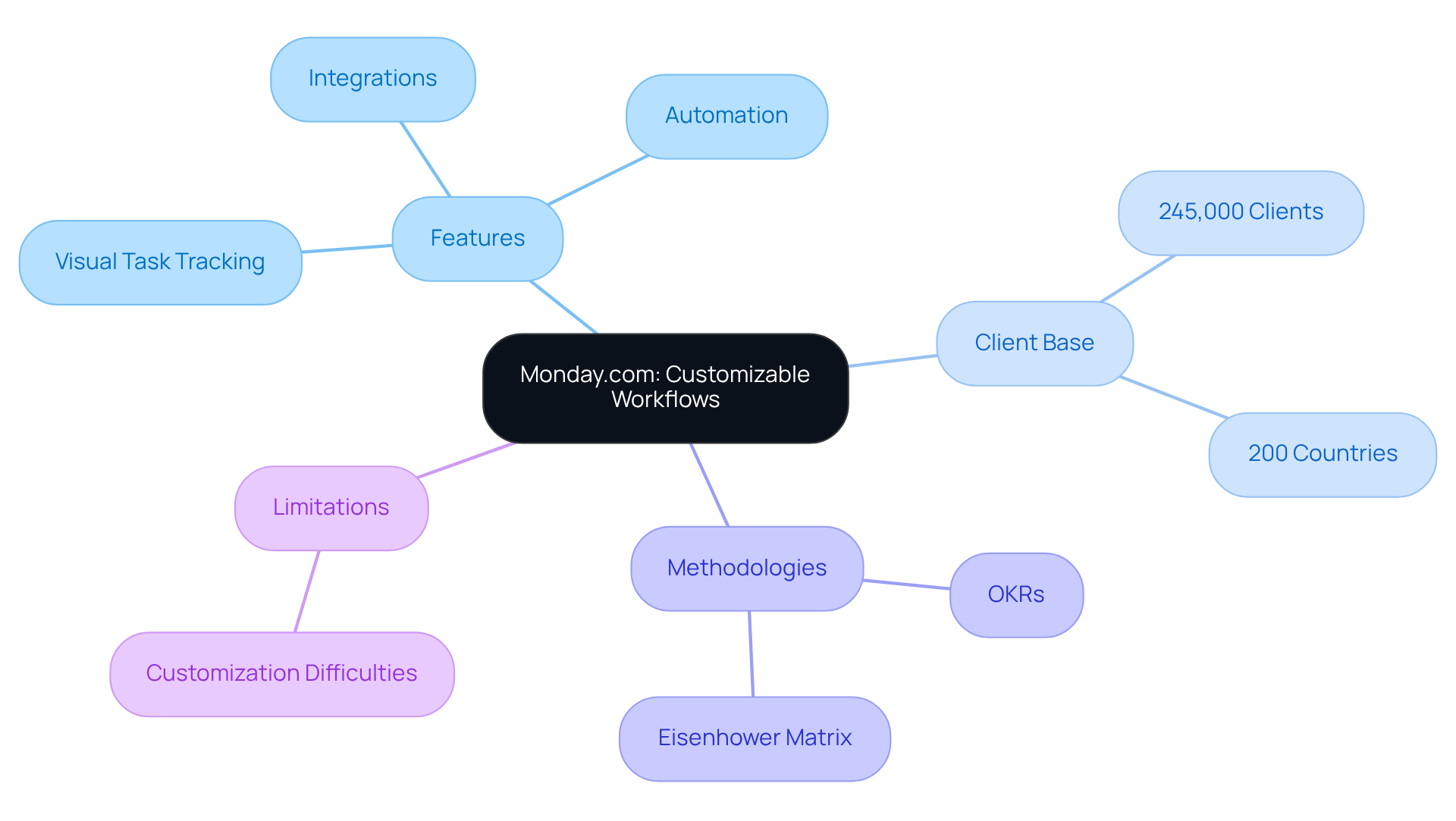
Wrike: Advanced Project Tracking and Reporting Features
Wrike offers sophisticated tracking and reporting capabilities that empower teams to monitor their progress in real-time. With customizable dashboards and in-depth analytics, new businesses gain invaluable insights into their performance. This data-driven approach enables teams using project management systems to identify obstacles and make informed decisions, ultimately enhancing efficiency and keeping tasks on track.
With 2.4 million customers globally, Wrike's effectiveness is well-established. Rachael Kealy, Content Marketing Manager at Wrike, underscores, "The more we talk to our 2.4 million customers around the world, the more we realize that we’re all increasingly working outside of the office, whether it’s on a bus, at school pick-up, or in between meetings offsite." This statement highlights the critical need for project management systems that facilitate real-time reporting for startups striving to adapt swiftly in a fast-paced environment.
Furthermore, the recent AI update launched on June 30, 2025, exemplifies Wrike's commitment to continuous improvement, further enhancing its relevance in management.
![]()
Basecamp: Simplified Project Management with Strong Communication Tools
Basecamp is designed to streamline task management by integrating robust communication resources within a single platform. This enables groups to manage tasks, share files, and communicate effectively, all in one place. Such an efficient method reduces the need for multiple resources, allowing startups to stay organized and focused on their core endeavors. The simplicity of Basecamp ensures that teams can quickly adapt and begin collaborating without unnecessary complexity. With over 75,000 organizations utilizing Basecamp, its effectiveness in promoting transparency and efficiency is well-documented.
However, some users have raised concerns regarding the absence of time-tracking capabilities and Kanban support. Customer support for Basecamp has been rated 8/10, reflecting a high level of user satisfaction. As Brett Day noted, Basecamp serves as an excellent tool for individuals who require robust communication features and straightforward workflow tools to oversee tasks. This makes it a valuable resource for any new venture looking to enhance their management procedures.
Are you ready to elevate your team's productivity with Basecamp?
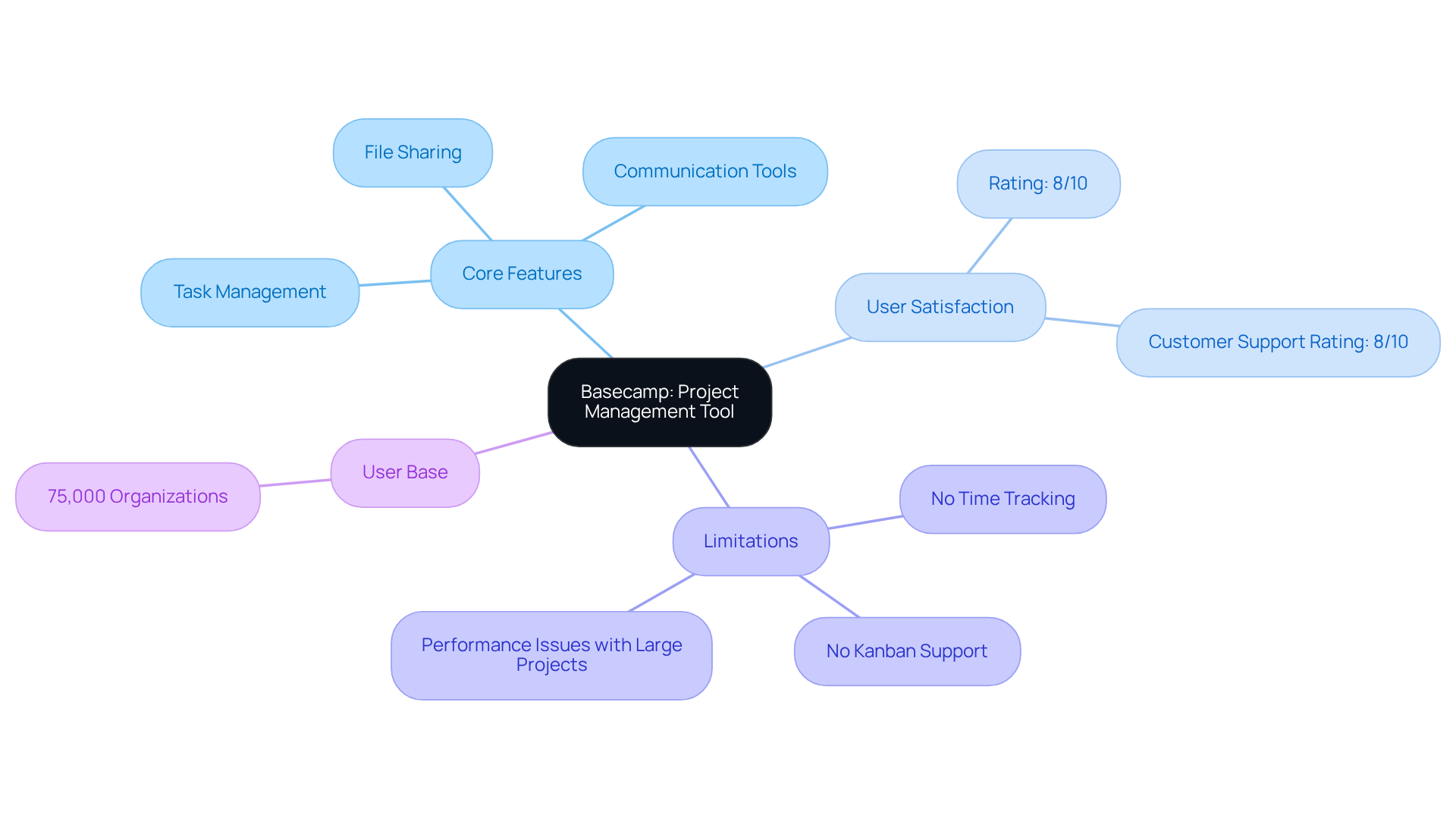
Smartsheet: Spreadsheet-Style Project Management for Complex Tasks
Smartsheet effectively merges the familiarity of a spreadsheet interface with robust management capabilities, establishing itself as an optimal solution for teams tackling complex tasks that necessitate meticulous tracking and collaboration. With features such as Gantt charts, resource management, automated workflows, and built-in approvals, Smartsheet ensures that teams have access to the latest information for file sharing. This empowers startups to maintain oversight of their tasks while leveraging a format that many users find intuitive.
This approach is particularly beneficial; research indicates that 58% of portfolio management (PPM) experts deem their current resources inadequate for managing disruptions. This statistic underscores the urgent need for user-friendly solutions. Furthermore, 87% of executives believe that enhanced resources would significantly improve their teams' efficiency in adapting to unexpected changes. Clearly, Smartsheet's features are designed to facilitate this necessary adaptation.
By utilizing a familiar interface and integrating AI capabilities, Smartsheet not only streamlines management processes but also accelerates the time to value for new businesses. This allows them to focus on strategic initiatives rather than being bogged down by cumbersome systems.
In light of the potential negative impacts of disruptions on profitability and customer satisfaction, Smartsheet emerges as an indispensable resource for startups aiming to navigate challenges effectively.
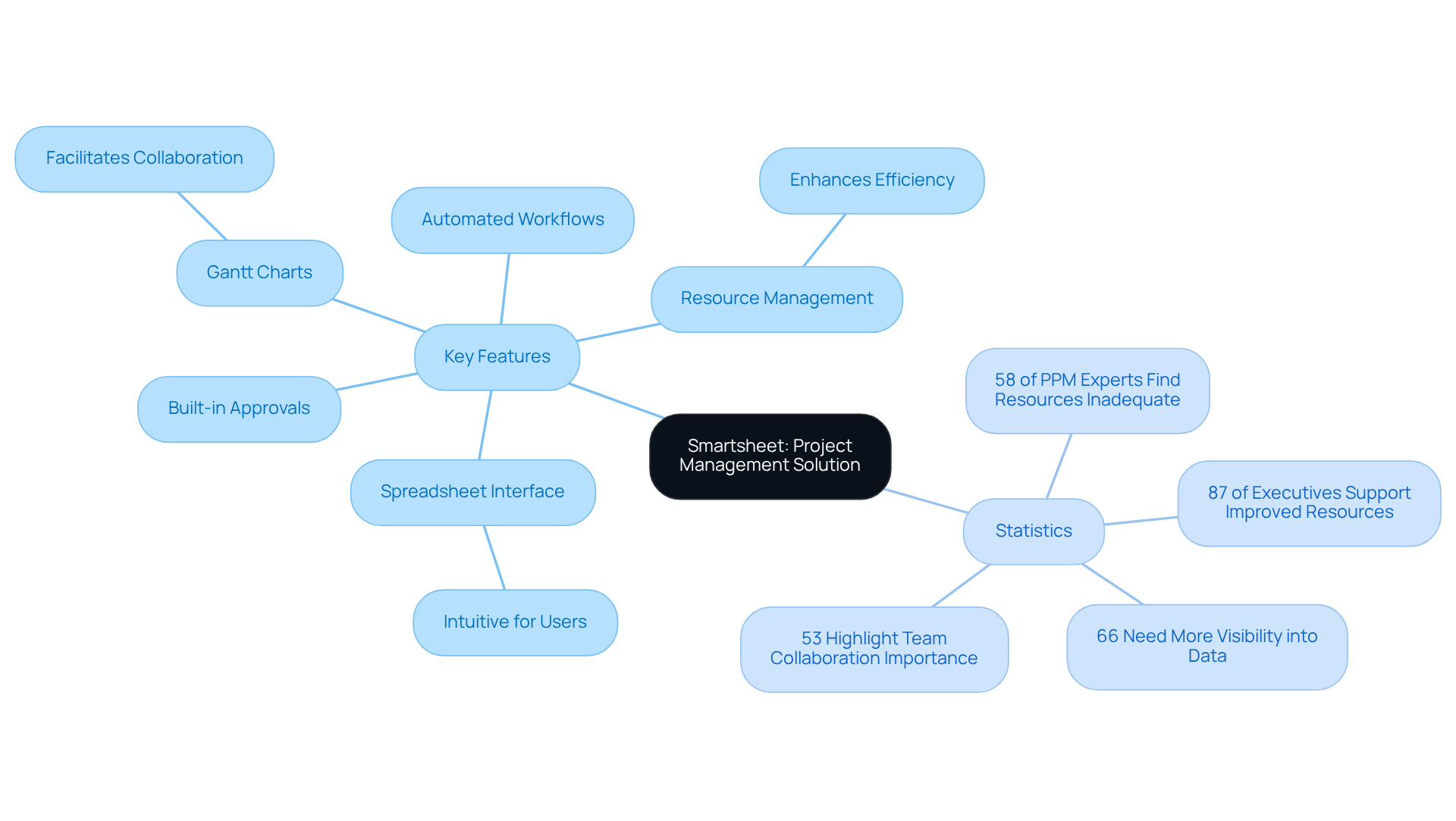
Jira: Agile Project Management for Software Development Teams
Jira stands out as a robust tool within project management systems specifically designed for agile software development groups. It effectively supports various agile methodologies, including Scrum and Kanban, enabling teams to plan, track, and release software with remarkable efficiency. Key features such as sprint planning, backlog management, and comprehensive reporting empower new ventures to maintain flexibility and responsiveness in their development processes. This flexibility is vital; in fact, 76% of agile groups regard visual roadmap resources as necessary for aligning objectives with business goals.
As Sean Blake, Head of Marketing at Easy Agile, asserts, "If you're able to quickly shift from one area of focus to another before your competitor does, then you have a competitive advantage in the market."
By leveraging Jira, startups can swiftly adjust to changing requirements, ensuring they remain competitive in a dynamic market environment. Furthermore, with the forthcoming combination of Jira Work Management and Jira Software, users can anticipate a more streamlined experience that enhances management capabilities, rendering it an even more essential resource for agile teams.
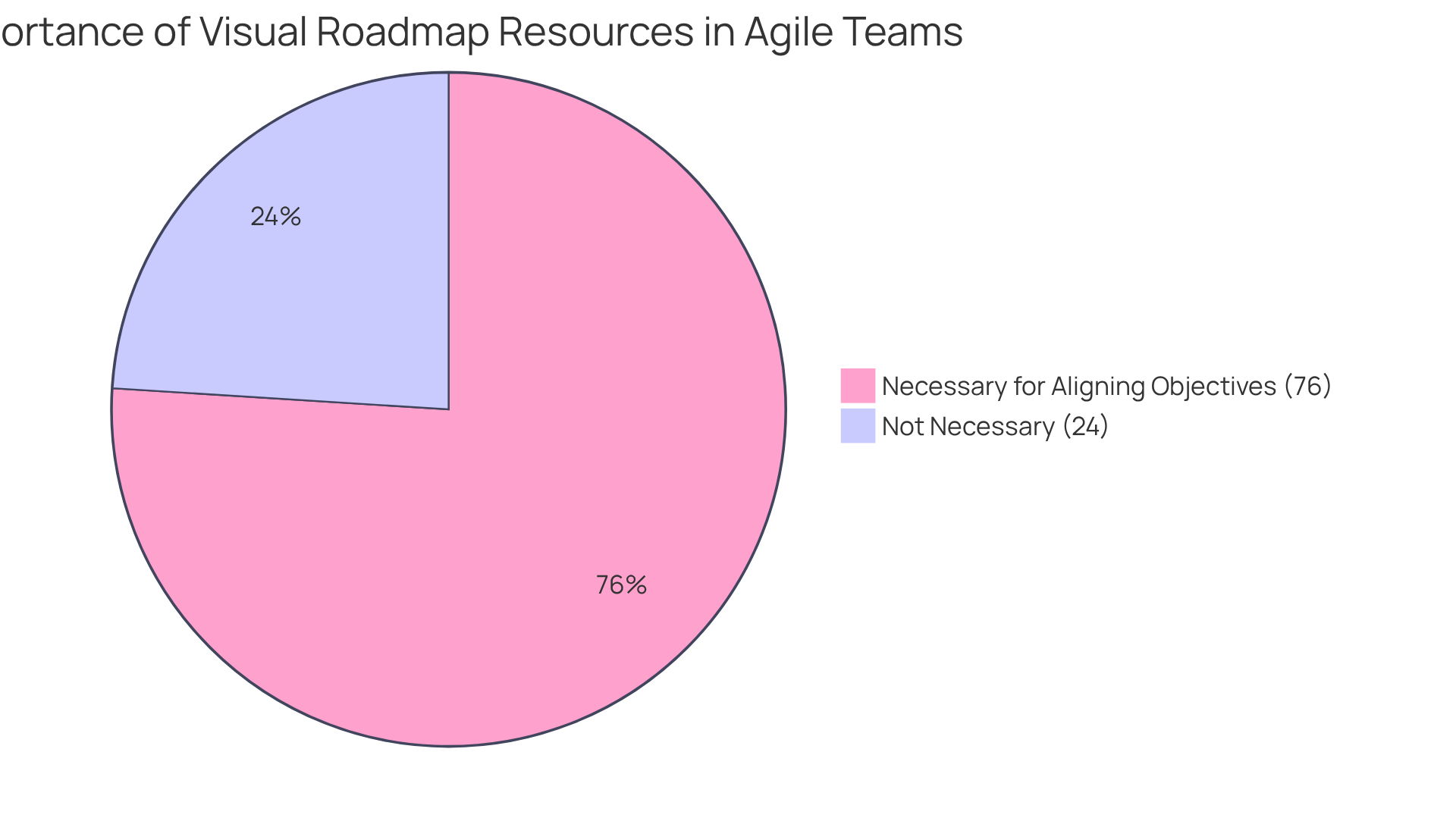
Notion: All-in-One Workspace for Notes, Tasks, and Databases
Notion stands as a comprehensive workspace, seamlessly integrating notes, tasks, databases, and collaborative resources into a singular platform. This remarkable versatility positions it as an ideal solution for startups striving to manage diverse aspects of their projects through project management systems without the hassle of juggling multiple tools.
Have you ever felt overwhelmed by the need to coordinate various applications? Notion alleviates this burden through customizable templates and an intuitive interface, empowering teams to craft a workspace tailored to their unique workflows. This not only enhances collaboration but also significantly boosts productivity.
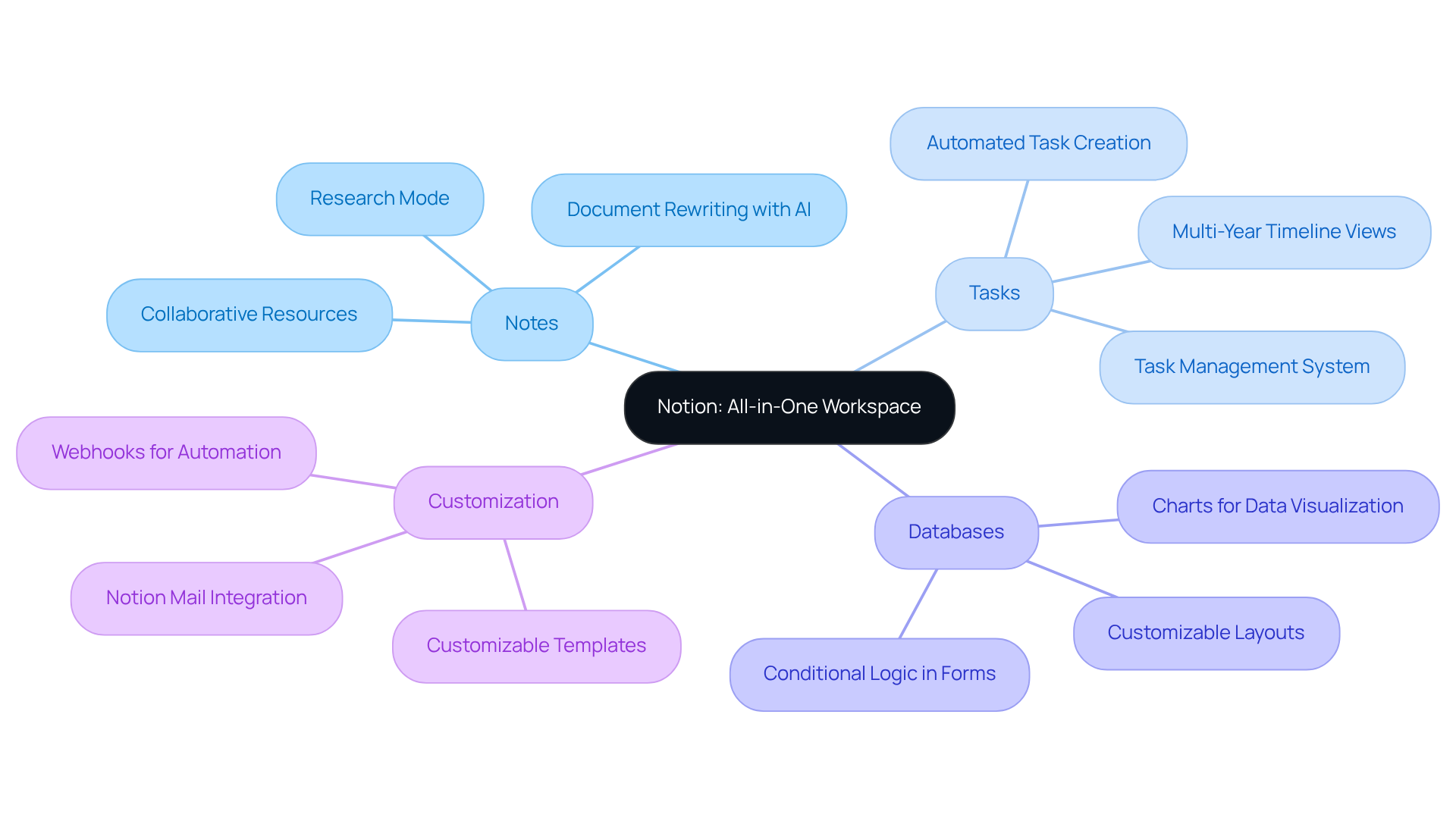
Conclusion
In the fast-paced world of startups, selecting the right project management system is not just important; it can significantly influence productivity and team dynamics. This article highlights ten innovative tools that cater to diverse needs, from automation and goal tracking to user-friendly interfaces and advanced reporting capabilities. Each system, including Casy, ClickUp, and Jira, boasts unique features designed to streamline workflows and enhance collaboration. These tools are invaluable resources for startups aiming to thrive in competitive environments.
Key insights emphasize the importance of automation, visual task management, and customizable workflows. These elements can lead to substantial time savings and improved team alignment. Tools like Asana and Trello are recognized for their intuitive designs that facilitate quick adoption and effective communication. Meanwhile, platforms such as Wrike and Smartsheet provide sophisticated tracking and reporting functionalities that empower teams to make informed decisions. The collective advantages of these project management systems underscore their role in fostering efficiency and innovation among startups.
Ultimately, embracing the right project management system is crucial for startups seeking to navigate challenges and capitalize on opportunities. By leveraging these tools, teams can enhance collaboration, streamline processes, and adapt swiftly to changing demands. As the landscape of project management continues to evolve, investing in these systems will not only improve productivity but also position startups for long-term success.
Frequently Asked Questions
What is Casy and how does it function in task management?
Casy is a task management automation tool that integrates seamlessly with chat platforms like Slack and Telegram. It captures key information from conversations and transforms them into actionable tasks automatically, reducing the need for manual input and minimizing miscommunication.
What features does Casy offer to enhance productivity?
Casy offers features such as automated task creation, planning, and categorization of tasks into areas like R&D and Bugs, specifically designed to improve productivity in fast-paced business environments.
What benefits have companies experienced by using Casy?
Companies using Casy for task management automation have reported saving over 10 hours each month by automating frequent activities, which highlights the effectiveness of incorporating chat features into their operations.
How is automation in management applications expected to evolve by 2025?
By 2025, the trend of automation in management applications is expected to continue expanding, with new businesses increasingly relying on these solutions to enhance workflows and facilitate collaboration.
What is ClickUp and what functionalities does it provide?
ClickUp is a comprehensive project management system that integrates task management, goal tracking, and collaboration features. It allows teams to visualize progress through customizable dashboards and align daily tasks with overarching objectives.
How does ClickUp contribute to team productivity?
ClickUp helps ensure that team members remain aligned and focused on shared goals, which is crucial for productivity. Research indicates that happy workers are 20% more productive, highlighting the importance of effective goal tracking.
In what ways can Asana improve team collaboration?
Asana enhances team collaboration through its user-friendly interface, which allows teams to easily initiate projects, assign tasks, and track progress. Features like timelines and task dependencies facilitate efficient project management.
How does Asana support remote work?
Asana supports remote work by providing powerful visual tools, seamless communication features, and advanced automation, making it an ideal solution for remote teams striving for coordination.
What are the potential limitations of using Asana for larger teams?
Asana's task-centric model may pose challenges for larger teams managing complex projects, which is an important consideration for startup founders thinking about scaling their operations.




